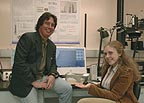April 18, 2007
Student to present research findings on Capitol Hill

Caption follows story
Sara N. Reardon, a microbiology major who grew up in Springfield, is one of 60 students chosen by the Council on Undergraduate Research from a national pool to participate in the group's annual "Posters on the Hill"exhibit.
"This is truly an honor for Sara — the competition is fierce, with hundreds of applications submitted," said Jo A. Nast, director of the University's REACH program, which teams faculty researchers with undergraduate apprentices to make research an important part of the students' academic experience.
Reardon, who left high school a year early to enroll at Lincoln Land Community College before transferring to SIUC, began working in the research lab of physiologists Michael W. Collard and Jodi I. Huggenvik less than two months after she started her freshman year.
Collard, who with his colleague created the lab position for Reardon right after they met her, said they knew almost immediately they'd made the right decision.
"It doesn't take long in the lab to realize that someone has an exceptional intellect," he said.
"She also has drive and ambition, which move people faster than they normally would. She has a love of science, and that makes people perform better. If an experiment fails, she's willing to change the design or parameters until it works. That's important because in a lot of our research, it doesn't work the first time around — or the 10th."
"Or 18 months later," Reardon added, with a smile.
The researchers first assigned Reardon the job of maintaining their mouse colony. Some of these mice lack a working copy of a gene called DEAF-1 that when active might suppress cancer. Inactive versions may adversely affect sperm development.
"We knew there was this defect in male fertility," Collard said.
"It was Sara who started to look at hundreds of cross-sections of testes to see if there was a loss of cells there. She established to what degree this loss occurs and the genetic background that produces it."
That work took second place in Washington University Medical School's first St. Louis Area Undergraduate Research Symposium last year.
"From there, we realized that the genetics were telling us that the difficulties weren't just due to the knock-out of our DEAF-1 gene, but that there were subsequent events in the offspring that were genetically normal — these mice still had fertility difficulties," Collard said.
The explanation, they felt sure, lay in a relatively new biological concept called epigenetics, which holds that changes can occur in DNA without changing the sequences of its component pairs and that these changes can both affect the way genes are expressed and be inherited over many generations. Thus, their genetically "normal" mice could still suffer from inherited fertility problems, obesity and prostate cancer.
"Sara has invented techniques to look at changes in DNA in 7,000 mouse genes using a process called microarray (which displays a collection of microscopic bits of DNA, with each bit representing a single gene)," Collard said.
"What she's now trying to do is compare the knock-out mice and their normal littermates with wild-type mice that won't have epigenetic defects to determine which genes are altered by DEAF-1 deficiency."
Reardon, who plans on a career in biomedical research, will continue to work with DEAF-1 next year in the Collard-Huggenvik lab as a master's student at SIUC.
"It would be interesting to discover that this gene is involved in hereditary forms of cancer," she said.
Caption: Mouse in the House — Sitting in mentor Michael W. Collard’s lab at Southern Illinois University Carbondale, undergraduate researcher Sara N. Reardon holds a member of the large mouse colony with which they work. A poster featuring Reardon’s research on genetic links to infertility and cancer will go on display April 25 on Capitol Hill.
